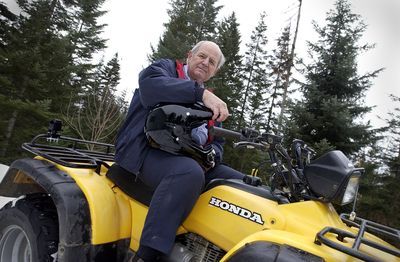Gas tax grab raises ire
Off-roaders upset that forgone refund redirected

BOISE – More than 30 years ago, Idaho’s boaters, snowmobilers, dirt-bikers and ATV riders made a deal: They’d give up their gas tax refunds for gas burned off-road if the state would direct that tax money to trails, boat launches and the like.
It worked. While farmers and log-truck drivers still get refunds for taxes paid on gas that actually gets burned off-road, off-road recreationists don’t. Instead, they benefit from $4.8 million a year – 3 percent of gas taxes collected – dedicated to the Idaho Department of Parks and Recreation for waterways improvements, off-road trails, park roads and bridges, and search and rescue.
Now, however, a deal between lawmakers and Gov. Butch Otter to divert that gas tax money to road maintenance has recreationists steamed.
“If they want to take that back, then give us the refunds back,” said Tom Crimmins, a Hayden Lake trails consultant and retired forester. “We want the money to go back where it ought to go, and it ought to go to Parks and Rec.”
If Idaho needs more money for highways, he said, “They’re better off getting the funding from fuel tax that’s burned on the highways.”
Crimmins spoke out at a recent state Parks Board meeting in Boise, and motorized recreation groups around the state are organizing to oppose the funding deal. When a special legislative task force starts meeting later this summer to address possible alternative funding sources for parks and for the Idaho State Police, which also would lose millions in gas tax funding a year from now under the deal, “We plan to be there en masse,” Crimmins said.
The recreationists are particularly upset because during this year’s legislative session, they successfully worked to raise their own ATV registration fees from $10 to $12 a year. The increase, which takes effect Jan. 1, will be divided between law enforcement and the state Department of Lands, to offset damage caused by off-road recreation on state lands.
“I think they have a legitimate concern,” said state Sen. Jim Hammond, R-Post Falls, one of eight members of the special legislative task force.
Hammond, who voted for the session-ending transportation funding deal, said, “I knew they were scratching for every gas tax dollar they could find. … We have to find a way to fairly replace those funds. They gave up those funds for that specific purpose.”
Steve Klatt of Sandpoint, the new chairman of the state Board of Parks and Recreation, said, “I always thought that was a fair law. … It is a user fee.”
In 1972, when the legislation first passed, it diverted 2 percent of the state’s gas tax collections to Parks and Recreation for the waterways and trails programs. Later, that was increased to 3 percent.
One problem is that Idaho’s gas tax hasn’t increased since 1996, and with most vehicles getting better gas mileage and higher gas prices prompting people to drive less, gas tax proceeds overall have been flat for years. That’s a key reason Otter’s been pushing to raise the gas tax and car registration fees – because Idaho’s main funding sources for roads haven’t kept up with the need to maintain the state’s road system.
“This compromise agreement that they reached gives them time to come up with something better,” said Otter spokesman Jon Hanian. “He’s got no pride of ownership on the plan. He’s just interested in the bottom line, and let’s … figure out a way of doing this.”
Otter has pushed for hundreds of millions of dollars more in road work each year to reverse a growing shortfall, but with lawmakers reluctant to raise taxes in a recession, he settled for just a few small steps this year, including the gas tax shift.
Idaho’s Constitution requires all taxes paid on gas “used to propel motor vehicles upon the highways of this state” to be spent on the “construction, repair, maintenance and traffic supervision of the public highways of this state.”
Crimmins said off-roaders got an unpleasant surprise when the trail and waterways money, without warning, showed up in the session-ending road funding deal.
“My personal perspective is if they need to raise that money from somewhere else,” he said, “then raise the gas tax, which is where it should come from.”